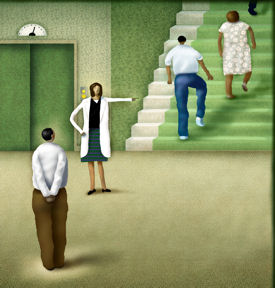A broken leg offers a first-hand look at health care reform
Finding treatment for a broken leg while overseas offers a first-hand look at health care reform in America.
The anticipated debate over U.S. health care reform has occupied this column over the past few months. The College made a major contribution to that debate with its recent comparative analysis of the health care delivery systems of 12 other countries [Annals of Internal Medicine, Jan. 1, 2008]. This column, however, is a more personal perspective. While foreign travel can provide first-hand glimpses into other health care systems, the lessons may be particularly instructive if travelers find themselves in need of health care while overseas.
Recently I had the pleasure of speaking in Morocco at a joint meeting of the Islamic Medical Association of North America and the Federation of Islamic Medical Associations. The meeting provided a rich array of topics for its 300 attendees. However, there was so much more to learn about health care beyond the meeting. A few days before it, my wife fell down a spiral staircase. Her foot went beneath the railing, causing immediate pain and swelling. With ice bag and elevation we began a Sunday afternoon search for health care in Casablanca. With the help of two young men, one of whom had lived in the U.S., she ultimately got very good care. They drove us around for about an hour, repeatedly stopping to quiz the occasional pedestrian out in the midday heat about where there might be a facility open on a Sunday. Eventually, we located a small, spartan but well-kept clinic in a residential neighborhood where X-rays confirmed she'd fractured her distal right fibula.
Our luck continued when one of these young men located by cell phone his brother-in-law, who was an orthopedist. I decided that this stroke of luck was payback for a year on the vestry. His explanation of the findings and proposed treatment were translated for us. Being unable to comprehend the Arabic or French spoken by the clinic personnel was certainly disconcerting. After such an experience, one has greater empathy with the many migrant Latinos in the U.S. trying to decipher health care instructions given in English.
Our health insurance held no sway in Morocco, so the episode provided our first experience of being numbered among the uninsured. We had only a modest amount of dirhams, the local currency. After the surgeon and a clerk conferred over the day's exchange rate, a hand calculator mercifully indicated that we had enough U.S. currency to cover the difference. Remarkably, the clinic visit, X-rays, cast and orthopedist's fee came to $270. At my hospital, the sum would have been one more decimal point to the right.
Receiving health care a long way from home certainly makes one appreciate the apprehension of out-of-towners who find themselves in our ER in the hands of physicians about whom they know little. Eager for the reassurance of having an orthopedist from home review my wife's films, I used a digital camera to capture close-up images of her X-rays on the view box. Our young translator kindly took us by his home to download the images from the memory card, enabling me to attach them to an e-mail to our local orthopedist. In a pinch, sending point-and-shoot digital images of X-rays attached to an e-mail became a teleradiology system for an internist.
With my wife's newly casted leg elevated on the back seat, we set out for another Sunday afternoon search. Finding a “pharmacie” open on a Sunday proved as difficult as finding a clinic. Our local guides noted that a GPS system scheduled to launch in Casablanca shortly would make similar searches easier. Eventually, we found crutches, analgesics and enoxaparin.
Getting an earlier flight home proved the final installment in this health care adventure. In a middle row of coach, my lap became an ottoman on which to elevate her newly broken leg and her cast became the working surface for the laptop upon which this column was written. Somewhere over the Atlantic, I gave her the second subcutaneous dose of enoxaparin.
Personal experience with health care abroad can remind us of the attributes of the U.S. system which we often take for granted. The College's recent analysis of the delivery of health care in 12 other countries reminds us of how much room the U.S. has for improvement.



